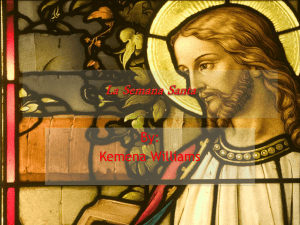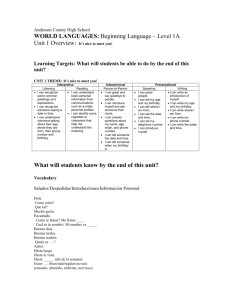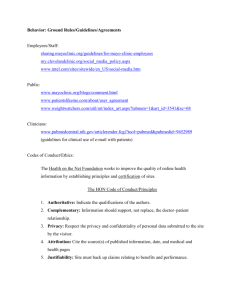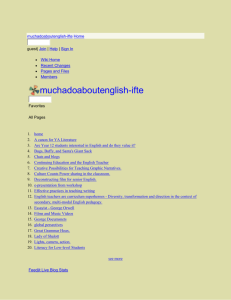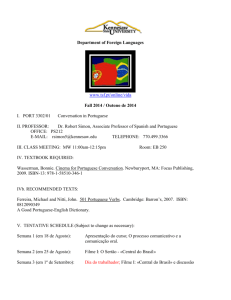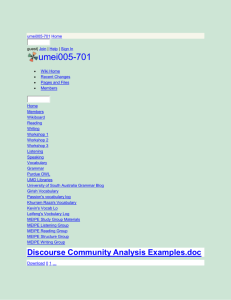Class Demeanor - UF Spanish and Portuguese Syllabi
advertisement
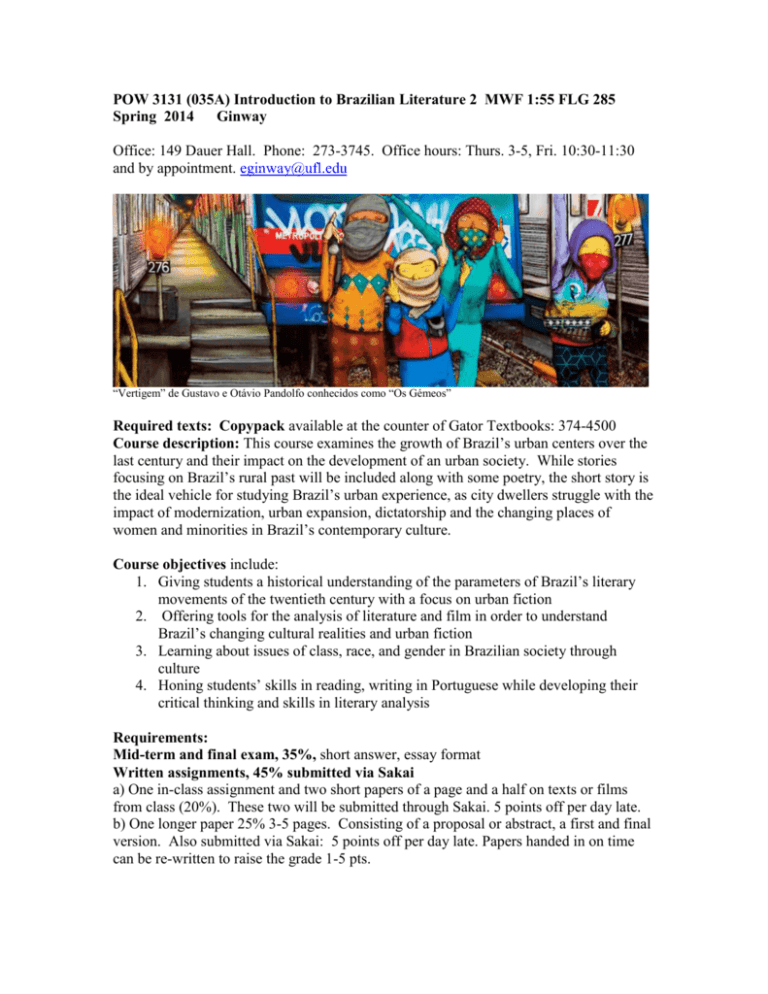
POW 3131 (035A) Introduction to Brazilian Literature 2 MWF 1:55 FLG 285 Spring 2014 Ginway Office: 149 Dauer Hall. Phone: 273-3745. Office hours: Thurs. 3-5, Fri. 10:30-11:30 and by appointment. eginway@ufl.edu “Vertigem” de Gustavo e Otávio Pandolfo conhecidos como “Os Gémeos” Required texts: Copypack available at the counter of Gator Textbooks: 374-4500 Course description: This course examines the growth of Brazil’s urban centers over the last century and their impact on the development of an urban society. While stories focusing on Brazil’s rural past will be included along with some poetry, the short story is the ideal vehicle for studying Brazil’s urban experience, as city dwellers struggle with the impact of modernization, urban expansion, dictatorship and the changing places of women and minorities in Brazil’s contemporary culture. Course objectives include: 1. Giving students a historical understanding of the parameters of Brazil’s literary movements of the twentieth century with a focus on urban fiction 2. Offering tools for the analysis of literature and film in order to understand Brazil’s changing cultural realities and urban fiction 3. Learning about issues of class, race, and gender in Brazilian society through culture 4. Honing students’ skills in reading, writing in Portuguese while developing their critical thinking and skills in literary analysis Requirements: Mid-term and final exam, 35%, short answer, essay format Written assignments, 45% submitted via Sakai a) One in-class assignment and two short papers of a page and a half on texts or films from class (20%). These two will be submitted through Sakai. 5 points off per day late. b) One longer paper 25% 3-5 pages. Consisting of a proposal or abstract, a first and final version. Also submitted via Sakai: 5 points off per day late. Papers handed in on time can be re-written to raise the grade 1-5 pts. Participation 10%. Students may demonstrate participation by answering questions in class, offering comments, participating actively in group work, consulting story worksheets on Sakai and by writing thoughtful on time blog comments. Students are also expected to consult the worksheets in order to prepare the readings before class. Absence policy. Timely arrival, regular attendance and participation are expected. Five or more absences will result in lowering the final grade: 1 pt per absence in excess of 5. Illness-related or university business absences do not require a medical excuse. Makeups will be offered in compliance with the university policies and in cases of documented emergencies or illness. Presentations and blogs 15%: The presentations are short. They should be no longer than a paragraph, summarizing the themes of the previous week’s class. They may be read or presented spontaneously and then should be posted on Sakai 10%. Other students should post comments to at least five of the presentations one week after the presentation. Comments must be made in a timely manner, or they will lose points. Note that students will have one week to comment on the presentation before it is taken down from Sakai. If a student fails to complete five comments by the end of the semester, they will lose one point from the 5% from the blog grade. Expectations for written assignments: In the advent of illness, crisis or absence, please write me an e-mail. Students who hand in their work on time and wish to work on their Portuguese or develop their ideas may hand in a corrected version of their previous entry for an improved grade. This grade is based on timeliness and thoughtfulness of assignments. Due dates are on the syllabus. If you have an illness, please contact the professor regarding late work. Grading Scale: 94-100 A 90-93 A- 86-89 B+ 83-85 B 80-82 B- 77-79 C+ 73-75 C 7072 C- 66-69 D+ 63-65 D 60-62 D- 59 Semana I 6-8-10 de janeiro S Introdução, explicação de requisitos, a explicação da coletânea, e o conto “Cem anos de perdão” de Clarice Lispector e discussão de várias abordagens críticas ou analíticas. Q O conto como gênero, contos de adolescência em “O cavalo imaginário” de Moacyr Scliar e “Meio-dia” de Luiz Alfredo Garcia Roza S Comentário 1: Exercício escrito: comentário sobre um dos contos discutidos em sala de aula baseado na discussão em sala Semana II 13-15-17 de janeiro 1900-1920 S Pré-modernismo: João do Rio: “O bebê de tarlatana rosa” coletânea Contos (veja a Coletânea de Literatura brasileira ou CLB, pp. 155-160 sobre o Prémodernismo) Q João do Rio: “A semana santa” (1911) S Lima Barreto: “O homem que sabia javanês” (1911) Revisão Comentário 1 Semana III 20-22-24 de janeiro 1900-1920 S MLK Feriado Q Lima Barreto: “A nova Califórnia” (1911) S Monteiro Lobato: “O jardineiro Timóteo” (1920) Clipes do filme Triste fim de Policarpo Quaresma Apresentação 1 _____________________/Blog até 31 de janeiro Semana IV 27-29-31 de janeiro, Os anos 20 S Vanguarda européia e o Modernismo brasileiro (CLB) Mário de Andrade: “Ode ao burguês” (1922) (CLB, 199-203) Q: Macunaíma, Cap. 1. (1928) S Macunaíima, Cap. 2 [Filme: Macunaíma (1969), dir. Joaquim Pedro de Andrade (105 minutos)] Apresentação 2__________________/Blog até 7 de fevereiro Blog 1 3 de fevereiro Comentário 1 uma página e meia sobre um dos autores prémodernistas, João do Rio, Lima Barreto, Monteiro Lobato, ou o modernista Mário de Andrade ou sobre um dos filmes Triste fim de Policarpo Quaresma ou Macunaíma Semana V 3-5-7 de fevereiro Os anos 20 S Oswald de Andrade: Poemas (CLB, 206-210) Anos 20 Comentário 1 Q Oswald de Andrade: “Manifesto Antropófago” (1928) S Alcântara Machado: “Gaetaninho,” “Amor e Sangue” (1927) Apresentação 3 _________________________/Blog até 14 de fevereiro Blog 2 Semana VI 10-12-14 de fevereiro Os anos 30 S Modernismo dos anos 30 Leia CLB 245-250, Graciliano Ramos, Vidas Secas (1938) “Mudança” e “Baleia” Q Graciliano Ramos S Gastão Cruls “O espelho” (1938) Apresentação 4 _____________________/Blog até 21 de fevereiro Blog 3 Semana VII 17-19-21 de fevereiro Os anos 40/50 S Carlos Drummond de Andrade: poesia, anos 40 (CLB 222-228 poemas); conto: “Flor telefone moça” (1951) Revisão Com. 1 Q Carolina Maria de Jesus: seleções do diário Quarto de despejo (1955) S Poesia concreta anos 50-60 (CLB, 285-287), revisão Apresentação 5 _______________________/Blog até 28 de fevereiro Blog 4 Semana VIII 24-26-28 de fevereiro, Os anos 60 S EXAME Q Clarice Lispector: “Amor,” “A galinha” (1962) S “Feliz aniversário” (1962) Blog 5 Semana IX 3-5-7 de março: Férias Semana X 10-12-14 Os anos 60/70 S Dalton Trevisan: Penélope (1961) e “O vampiro de Curitiba” (1965) Q Rubem Fonseca: “225 gramas” (1963) e “O exterminador” [O quarto selo] (1969) S José J. Veiga: “A máquina extraviada,” e “O galo impertinente” (1968) Apresentação 6 _____________________________/Blog até 21 de março 14 de março Comentário 2 sobre autores modernistas e posteriores: Oswald de Andrade, Alcântara Machado, Graciliano Ramos, Gastão Cruls, Drummond, Carolina Maria de Jesus, Clarice Lispector, Dalton Trevisan, Rubem Fonseca, J. J. Veiga Semana XI 17-19-21 de março Os anos 60 S João Guimarães Rosa: CLB, 266-270; “A menina de lá,” [“Os irmãos Dagobé”], “A terceira margem do rio” (1962) Q Filme: A terceira margem do Rio [ICFA] S Filme: A terceira margem do Rio [ICFA] Blog 6 Semana XII 24-26-28 de março Os anos 70/80 24 de março Tópico ou proposta para o trabalho escrito S Murilo Rubião: “Bárbara,”“O edifício,” e “A cidade” (1974) Q Lygia Fagundes Telles: “Tigrela” (1977) S João Gilberto Noll: “Alguma coisa urgentemente” (1981) e Caio Fernando Abreu: Linda, uma história horrível (1988) Semana XIII 31 de março 2 e 4 de abril Os anos 80/90/2000 S Márcia Denser: “Hell’s Angels” (1986) Rev. Comentário 2 Q Regina Rheda: “O mau vizinho (1994); Miriam Alves, “Alícia está morta” (1998) S Marçal Aquino “Gambés” (2001) Semana XIV 7-9-11 de abril Os anos 2000 S TRABALHO ESCRITO para dia 7 de abril S O invasor (2003) de Beto Brandt filme baseado no livro de Marçal Aquino Q O invasor S Ferréz “Assunto de família” (2006) Roberto de Sousa Causo, “O novo protótipo” (2009) Semana XV 14-16-18 de abril Os anos 2000 S Lourenço Mutarelli, O cheiro do ralo (2002) Q O cheiro do ralo S O cheiro do ralo Versão revisada do trabalho escrito 18 de abril (opcional) Semana XVI 21-23 de abril Revisão S Avaliação Q Revisão para o exame final Exame Final: May 1, 10-12 AM. Grading criteria for the evaluation of written work in literary studies: exams Writing shows little evidence of reading texts, clichés, or wrong topic =D- D D+ Basic knowledge of the concepts from the class, some examples from the texts, and a use of generalizations that do not pinpoint thorough knowledge of texts=C- C C+ Considerable knowledge of the concepts from class, with specific examples of the texts that aptly illustrate interpretation or theoretical framework =B- B B+ Thorough knowledge of the concepts from class, with specific textual examples, along with theoretical or critical basis or implications, plus original ideas or examples=A- A For papers, the same criteria apply, however, there must be a logical development of an argument or thesis, along with textual examples/quotation to support these ideas, and logical transitions to strengthen the interpretation. Students are encouraged to submit drafts of their papers early and will be allowed to turn in a rewrite to better their grade. Literary criticism from books or the internet may be used, but it is a point of departure for new ideas, or may be used to substantiate a point. Criticism or outside sources must be quoted and the source noted at the end of the paper to avoid plagiarism; if it is paraphrased without acknowledgment, it is plagiarized, and the result may be a failing grade. Plagiarism may result in a failing grade or judicial action that remains on your record. Be safe and always cite sources. The University of Florida requires this information on all syllabi: Class Demeanor Students are expected to behave in a respectful and responsible manner at all times. Cell phones, pagers, alarms, etc. should be switched off in class. Academic dishonesty will not be tolerated. The UF Honor Code states: http://www.dso.ufl.edu/judicial/academicguide.htm.) We the members of the University of Florida community, pledge to hold ourselves and our peers to the highest standards of honesty and integrity. On all work submitted for credit the following pledge is either required or implied: On my honor, I have neither given nor received unauthorized aid in doing this assignment. The University of Florida requires this information on all syllabi: Students requesting classroom accommodation must first register with the Dean of Students Office. The Dean of Students Office will provide documentation to the student who must then provide this documentation to the Instructor when requesting accommodation. University Counseling Center 392-1575. Mental Health services (Student Health Care Center) SHCC 392-1171. Educational behavior Every student in the class is expected to participate in a responsible and mature manner that enhances the educational process. Any conduct that, in the judgment of the instructor, disrupts the learning process will lead to disciplinary action. Confidentiality Student records are confidential. Only information designated "UF directory information" may be released without your written consent. Please see University Regulation 6C1-4.007 for a list of the categories of information designated as "UF directory information." UF views each student as the primary contact for all communication. If your parents contact me about your grade, attendance, or any information that is not "UF directory information," I will ask them to contact you. You may 1) provide the information your parents seek directly to them or 2) contact the University Registrar's Office for additional information. For more information: www.registrar.ufl.edu.ferpahub.html Students with disabilities Students requesting classroom accommodation must first register with the Dean of Students Office, who will provide documentation to the student. This documentation must be presented to the Instructor as soon as possible in order to arrange for the accommodations. Course Evaluations Students are expected to provide feedback on the quality of instruction in this course based on 10 criteria. These evaluations are conducted online at https://evaluations.ufl.edu. Evaluations are typically open during the last two or three weeks of the semester, but students will be given specific times when they are open. Summary results of these assessments are available to students at https://evaluations.ufl.edu/results. Counseling and Wellness A variety of counseling, mental health and psychiatric services are available through the UF Counseling and Wellness Center, whose goal is to help students be maximally effective in their academic pursuits by reducing or eliminating emotional, psychological, and interpersonal problems that interfere with academic functioning. The Center can be found online at http://www.counseling.ufl.edu/cwc or reached by phone at 392-1575. Drop and withdrawal dates Consult the current Undergraduate Catalog.
